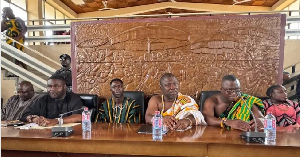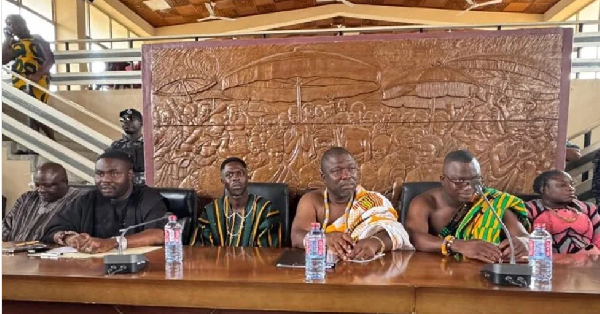 James Gunu (third from right) with the MDCEs in the House
James Gunu (third from right) with the MDCEs in the House
The Volta Regional House of Chiefs (VRHC) has expressed concern over the increasing cultivation of marijuana across the region, particularly the growing involvement of the youth, following the approval of a specific strain of marijuana for medicinal use.
The chiefs warned that the situation, if not urgently addressed, could jeopardise the future of the youth.
Reports reaching the House indicate a sharp rise in drug abuse among young people, including students, prompting calls for swift security intervention.
President of the House, Togbe Tepre Hodo, raised the alarm during the VRHC’s first general meeting of the year, held in Ho last Friday.
He emphasised that the youth were the nation’s future leaders and needed to be protected from harmful practices that could derail their potential.
He also highlighted the increasing number of unresolved chieftaincy and land disputes as a major development challenge for the region.
According to him, the VRHC currently has 69 chieftaincy cases pending adjudication.
Togbe Hodo criticised the practice of installing rival chiefs in areas where no vacancy exists, stressing that unless a chief is properly removed or passes away, such actions only contribute to disorder.
He urged traditional areas with legitimate destoolment concerns to follow legal processes and work with the House to resolve issues amicably.
The House President further called for stronger collaboration with stakeholders to advance the region’s development agenda.
He expressed disappointment over the lack of engagement from Members of Parliament (MPs) from the Volta Region, noting that repeated efforts to involve the Volta Parliamentary Caucus in development discussions had yielded no results.
“They do not attend our meetings, and they fail to even answer our calls,” he lamented.
In response, the Volta Regional Minister, James Gunu, who attended the meeting along with 18 Municipal and District Chief Executives (MDCEs), pledged to work with the VRHC to ensure better cooperation with the region’s MPs.
He said their involvement was critical to discussing and resolving development challenges.
Gunu acknowledged the vital role of traditional rulers as symbols of unity and custodians of culture.
He commended them for their continued contribution to peacebuilding in the region and assured them of support from the Volta Regional Coordinating Council (VRCC).
He also promised to help strengthen the House’s judicial committee by enhancing the capacity of its members. T
his, he emphasised, would enable them to handle chieftaincy disputes more effectively and swiftly, as prolonged conflicts often delay development.
Moreover, touching on infrastructure, Gunu revealed that the government had planned a number of key projects for the region.
These include the reconstruction of the Ho-Aflao road, and initiatives under the 24-hour economy policy, particularly harnessing the potential of the Volta Lake for economic growth.


